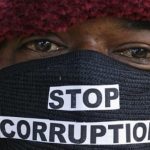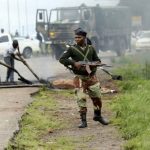James Duddridge (Rochford and Southend East) (Con)
I draw hon. Members attention to my entry in the Register of Members’ Financial Interests. I praise the hon. Member for Vauxhall (Kate Hoey) for securing the debate and for the tireless work she does through the all-party group, which is one of the most exceptional groups in the House, among many candidates. She spoke of how members of the Zimbabwean opposition have been fearless, but she has been pretty fearless over the years in going to Zimbabwe. As she noted, her most recent trip was funded by the Commonwealth Parliamentary Association, which I chair. I encourage other hon. Members with specific interests in countries to come to us if they want funding for that type of trip.
In private, I have occasionally accused the hon. Member for Vauxhall of being a bit pessimistic. I was always more optimistic about Zimbabwe as Minister for Africa and, subsequently, through the Commonwealth. Sadly, again, she has been proven right and a realist about the situation—the reality held up. That is a lesson not just for our ambassadors but for many others who go into Zimbabwe but perhaps do not have the decades of experience that the hon. Member for Vauxhall has.
Although I do not have the same experience, I have a long-standing interest in Zimbabwe. When I worked for Barclays in Africa, when things were doing well, all the pan-African IT for Barclays was run out of Harare—as, in fact, were all the IT systems for the whole Caribbean. That seems somewhat ridiculous, given the current situation.
Like many, I want Zimbabwe to return to being a prosperous nation state with proper elections, and I want it back as part of the Commonwealth family. Prior to the elections, however, I was premature in calling for it to be brought back into the family in a less conditional environment. I am still a bit more optimistic than the hon. Member for Vauxhall about keeping up engagement—what was called incremental engagement—which revolved around trying to move forward a little when there were some changes on the other side.
The news coming out of Zim is not only disturbing but wholly unacceptable. In the wake of peaceful civilian protests, the security forces launched brutal crackdowns across Harare and the country. Excess force and brutality, arrests and detentions are being used by the police and soldiers—and they are arbitrary arrests, because there is no law enforcement. That needs to stop.
In Rochford and Southend East, there are 889 people of Zimbabwean heritage, which is about 1% of my constituents. I have heard directly from them horrific tales and allegations about the systemic use of violence and torture by the armed and uniformed members of the Zimbabwe National Army and the Zimbabwe Republic Police, particularly in high-density areas outside Harare and in the suburbs.
One story recounted to me relates to a young man who lives in Budiriro, a high-density suburb in the south-west of Harare. He was rounded up with his neighbours and brutally set upon by police. His only crime appeared to be that he lived in the wrong street. Groups of young men had been setting up roadblocks on neighbouring streets and stopping and throwing stones at a few of the cars that remained despite the high petrol prices. The police were sent in and, instead of investigating the complaints, went round to all the homes near the roadblocks and dragged out and beat all the young men who were there, regardless of whether they were involved or not—collective punishment of the community for what had been done by a few. Some of those men are being held without charges or representation, and with no food or water. We cannot condone or accept that behaviour.
John Howell (Henley) (Con)
That story is horrific, but the problem lies subsequent to that, as they have no legal remedy because the judiciary is not independent. A number of lawyers have been protesting in the streets in the last few months. What should we be doing to support those lawyers who are trying to get an independent judiciary?
James Duddridge
There is lots that we can do. The hon. Member for Vauxhall talked about the problems of the legal service. It is worse—the Government are directing the courts as to what to do. There is a series of long-term actions, such as working through the Commonwealth Parliamentary Association and other Commonwealth countries, but at the moment, the Government in Zimbabwe are simply not listening.
My hon. Friend the Member for Henley (John Howell) describes the situation as terrible, but unfortunately, I have not got to some of the worst bits, which gives me no pleasure to say. There have been several reports about the use of sexual violence, in particular. On 23 January, ITV reported rape claims against soldiers during the unrest. It is my understanding that ITV has met 11 women, all of whom said they were sexually assaulted—that is to say, raped—and that their attackers were members of the Zimbabwean army. This appears to have been systemic and organised use of sexual violence, which should concern us even more than isolated cases of sexual violence.
The reports of death tolls have been varied and, I suspect, understated. Amnesty said that eight people were killed when police and military fired on crowds, while the Zimbabwean Government said only three people were killed, including a policeman who was stoned to death by an angry crowd. The Zimbabwe Association of Doctors for Human Rights has said that doctors had treated 68 cases of gunshot wounds and more than 100 other cases of “assaults with sharp objects, baton sticks”, and they had seen people left with marks on their bodies after being kicked or stamped on with boots.
Notwithstanding the statement by my hon. Friend the Minister for Africa on Zimbabwe on 17 January and the representations that were made by the Secretary of State on 22 January, we need to ramp up our representations to our Zimbabwean counterparts. We need to remind them of their international obligations on human rights and freedom of opinion and expression, and about the results of the use of excessive force, as evidenced by the injuries that were documented in medical records; those are not just vague accusations.
President Emmerson Mnangagwa cut short his foreign trip, which had been largely aimed at raising foreign exchange and returning investment. He returned to Zimbabwe to stabilise the situation. Well, I have not seen any stabilisation of the situation. I listened very carefully to my right hon. Friend the Member for Mid Sussex (Sir Nicholas Soames) and the hon. Member for Vauxhall, who felt that the situation had been pre-prepared: petrol prices were put up; then, the President removed himself from the country; and there was a purge. I suspect that they are probably right.
Earlier, I had wondered whether there might be something else going on, namely that the military were taking greater control, as they did when there was the earlier coup that led to Mugabe being ousted. I wondered who really is in control of the country; is it the President or is it his Vice-President, the former army general, Constantino Chiwenga? Chiwenga was the muscle behind the November 2017 push that forced Mugabe to resign and I just wonder what is going on behind the scenes. The President is clearly responsible, whether or not he directed or planned the violence; he is the President of the country.
I support the points made by a number of people about getting South Africa involved and I urge that we try to get South Africa involved at both a Government level and an African National Congress level; the ANC contacts with ZANU-PF are even more credible than the normal channels. More broadly, there is a role for the Southern African Development Community, although Botswana, Zimbabwe’s neighbour, is particularly influential.
I am not a great fan of sending great missives from the UN, which feels very distant from African countries when they have problems. However, if the UN can do something in co-ordination with the African Union, led by Zimbabwe’s near-neighbours, such as South Africa and Botswana, through SADC, that would probably complete the loop and it would give the authority and voice of the UN to Zimbabwe’s local peers when they criticise the country.
I fear that the perpetrators and masterminds behind the systematic violence will be emboldened, not by our indifference or by what we say, but by what we do. We are very limited in what we can do, but we must try to do more. I also fear that there will be an increased open militarisation of the country, with further disregard for civil law and further unrest. In all conscience, we cannot allow that to happen.
Before the elections, I had hoped to welcome Zimbabwe back to the Commonwealth; I had hoped that more investment would come in; and I welcomed the CDC investment in Zimbabwe. I still think that that is the right route for the country to take ultimately. However, it seems less and less credible for us to support investment in Zimbabwe while the atrocities take place, although I am mindful that if British money does not come in, then Israeli, Russian or Chinese money, which would be less conditional money, will come in. I do not worry about that happening from the perspective of investment returns or British national interest; I worry about it because doing business in countries such as Zimbabwe allows us to leverage our influence within them. So, there is a fine balance to be struck.
I hope that I am proved right in my long-term optimism and I hope that the hon. Member for Vauxhall is wrong in her sometimes pessimistic attitude. However, I fear that yet again she is right. She is being a friend of Zimbabwe, but also a realist, and I thank her again for making an enormous contribution and for securing this debate.
Continued next page
(938 VIEWS)


